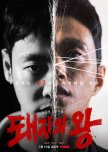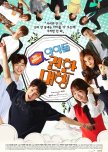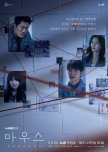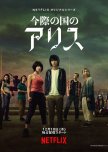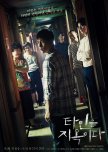 Bae Doo Na, Lomon, Ryu Seung Beom, and More Confirmed for the Cast of "Family Plan"
Bae Doo Na, Lomon, Ryu Seung Beom, and More Confirmed for the Cast of "Family Plan" A boy falls to his death at school, but Ok Chan Mi does not believe that her twin brother, Park Won Seok, committed suicide. She then transfers to her brother's school, Yongtan High, and meets Ji Soo Heon, who witnessed her brother's death. During that time a "hero," who avenges bullied students, appears at Yongtan High. Chan Mi speculates that it may be connected to her brother and starts looking for this hero. (Source: Hulu) Edit Translation
- English
- ภาษาไทย
- Русский
- Čeština
- Native Title: 3인칭 복수
- Also Known As: 3inching Bogsu , Third Person Revenge
- Screenwriter: Lee Hee Myung
- Director: Kim Yoo Jin
- Genres: Action, Thriller, Mystery, Drama
Where to Watch Revenge of Others
Subscription
Cast & Credits
- Shin Ye EunOk Chan MiMain Role
- LomonJi Soo HeonMain Role
- Seo Ji HoonSeok Jae BeomMain Role
- Chae Sang WooGi Oh SungMain Role
- Lee Soo MinKook Ji HyunMain Role
- Jung Soo BinTae So YeonMain Role
Reviews

A sad & highly topical social issue, dealt with in a palpable, exciting, sensitive, touching way
"Revenge of Others" is set in the world of South Korean high school students. No teenage squabble, but a story with substance and depth. With flexibly intertwined subplots, it offers a sad and highly topical social issue, dealing with it in a palpable, exciting, sensitive and touching way. Should you watch? Yes!"Revenge of Others" (like "Weak Hero Class 1" in 2022) deals with the topic of mobbing /bullying. In Korean, the slang term 'wang-ta' is quite common, and for me helped for a better understanding of the special and increasingly dramatic situation surrounding bullying at South Korean schools, which can even lead to suicide. (See side note below.)
This KDrama spotlights a Seoul high school where there appears to have happened a suicide. Everyone is shocked. Some know more. But if the sister of the victim, who has been living separated from her brother for many years, would not try to get to the bottom of it, then this would be a sad case of suicide without a murmur. It probably happens all too often in one way or another that fundamental questions in an apparently obvious case are left unanswered. However, this KDrama bravely wants to get to the bottom of the matter and its circumstances - here in the person of Ok Chang-mi.
As so often in the context of bullying, the adults don't look too good and don´t offer anything promising for making a difference regarding those fatal peer group dynamics. They are left outside. The high school students have to find a way for themselves to get along with their classmates - if possible highly adjusted underneath the social wang-ta radar (or at least with a solid network).
"Revenge of Others" is a production for the international streaming market. Things rarely get too brutal at Disney, though. The amount of violence is therefore limited (compared to e.g. "Weak Hero Class 1") and instead there is more room for relationship dynamics in side plots, causal connections and shades of gray.
By the way, in connection with "Revenge of Others" there is also a whole series of promising actors to admire!
---------------------------------
SIDE NOTE: --- Wang-ta in South Korea ----
With Wang-ta, the focus is not so much on the 'act' - bullying or harassment - but rather on the entire context of active and violent marginalizatin of an outsider. For example, it can be used as a swear word for the excluded person or as a description of the bullying activity. In a collectivist society like South Korea, group affiliation and group interest is paramount. This applies not only to the family, but also to the school class and also to the peer groups within the class or school. Unfortunately, this value system results in a fatal situation when it comes to actual bullying: bringing shame on the group, the outsiders are at the bottom of the social hierarchy. Whether it's because of school performance, family background, origin, belonging to an undesirable minority, looks, dress, a handicap, an unusual belief or an abnormal inclination: Wang-ta is a label that no one wants to personally be confronted with. Everyone agrees on that. At the same time, Wang-ta becomes a free pass for more or less cruel mobbing/bullying. Worryingly, perpetrators, victims, and witnesses alike accept the premise: all forms of bullying, almost anything related to Wang-ta, is permissible. The perpetrators take advantage of this, the victims immediately feel even more inferior in terms of their shortcomings (of whatever kind), and the bystanders silently nod the action as justified - or even actively join in. There is no moral barrier against this specifically cultural, collectivist background. It can even get out of hand. There are cases where the entire school has ended up participating in one person's wang-ta. From a Western, individualistic point of view, this is perhaps difficult to understand, because apart from group norms there are other socially recognized ethical principles that could be introduced as a serious confrontation of wang-ta behavior. Unfortunately, this hardly is the case at South Korean schools with a collectivistic social culture.
--------------------------------------
SIDE NOTE: In connection with this KDRama also an additional side note on
--- Punishment vs. Suffering of Victims ---
The psychological trauma for the bullying victims are with long-lasting effect. Unfortunately, the punishment of perpetrators is not proportionate to this day. Punishment is rather harmless - it may be annoying to the perpetrators, but not really a deterrent. Far too much must have happened before expulsion actually occurs. A corresponding entry in the files is actually completely deleted two years after graduation. In fact, nothing is left behind on the perpetrators' side. On the other hand, from the memory of the victims the experience cannot be so easily erased ...
The documented cases of wang-ta in South Korean schools (yet many are not officially reported) have steadily increased over the past three decades. According to a study by the Ministry of Education, between 2013 and 2017 the cases have more than doubled from 11.749 to 31.130. There are also increasing numbers of victims who saw suicide as their only way out. It has now been empirically documented that South Korean pupils with a personal Wang-ta experience are more suicidal than those without. Suicide is by far the most common cause of death among 10 to 24 year olds. Almost 1.000 young people took their own lives in 2020 alone.
In respect of the lack of serious consequences for the perpetrators in Wang-ta cases and their comparatively unsatisfactory punishment, a kind of vigilante justice has been established among the families of the victims concerned. "Revenge of Others" picks up on this (similar to "Angry Mom" a few years earlier) as a theme in variation.
In fact, facing a lack of serious alternative punitive measures it seems not uncommon for relatives of victims to pay someone of the same school age to take care of an appropriate 'punishment' - i.e. 'undercover'. Clearing up violence with violence is of course a dubious solution. Sadly, this seems to be the only way to show real consequences to the perpetrators and give the victims at least minimum size satisfaction. ...Although it should be probably considered more of a satisfaction for the relatives of the victims, because the victims themselves still have to deal with their psychological wounds and scars for a long time. Revenge does not undo the painful experience of mentally and physically harassing exclusion...
Was this review helpful to you?

This review may contain spoilers
The ending truly ruined it all
This review will contain heavy spoilers for the ending.Revenge of Others was a fun ride, until the last two episodes that is. It's pretty rare for me to have the ending of a show completely change how I feel about it. There are good endings, meh endings and bad ones... but I've seldom felt that disappointed. Maybe I had too high expectations, maybe it was the straw that broke the camel's back. Revenge of Others' ending is cliché, lazy and basically just a middle finger both to the audience and the rest of the show. Early episodes were good, with flaws, yes, yet it was still solid. But nowadays, most kdramas are great at what they do, so you need the entirety of your work to be good, not just the beginning, not just the middle. It feels like Revenge of Others was half-assed, and any good this show had is overshadowed by the ending.
The most interesting thing about a TV show, as opposed to movies, is that you have time to grow attached to the characters. You become familiar with them and grow curious. You could say you actually care about them (especially if you're watching while the show is airing). That is the exact reason why you can't just dump a few lines on the viewers and call it a day. That's not only bad writing: it's like spitting in the face of said viewers.
So what was so wrong with that ending? To put it simply, the creators of the show tried SO HARD to give it a happy ending, despite it not matching the tone of the series, that they ended up... basically not giving it an ending at all. How did they do that? By not telling you anything and letting you decide what comforts you. Okay, let's be fair. They do tell you a few things, but not about what is important.
> Soo Heon has a brain tumor? Okay, he drops out to do his own shit for a while and you're free to imagine whatever pleases you after that. Did he die? Did his condition stabilize? That's up to you (who even cares, brain tumors are not that serious now, are they? It's not like he got his head banged way too many times. If the doctor is as qualified as his wife, he probably misdiagnosed him anyway). With it being such a central plot point, you'd hope for something a bit more conclusive than a "for now he's lucky". Truthfully, the tumor is just a plot device to make you doubt he is the killer because of the induced violent behaviors. So in the end, I just wonder what was even the point of us worrying about him?
God forbid they'd actually use his condition to truly talk about the hardships that come from it all. Not saying the show should've solely focused on that, that's obviously not the plot, but it would've been nice if it had been treated more seriously.
> Is Jae Beom in prison or not? You choose. Was there even any proof that he was manipulated by Gi O Sung? Did he completely take the blame? Does it matter? Should we care? Apparently not, since the show decided to completely erase his existence the moment he stepped in that police car. If he is lucky, the car was actually an interdimensional rift that took him far away from the land of trash ending kdramas.
Don't get me wrong, open endings are fine. I actually love them to death and dislike when everything is spelled out for you. However, this is not an open ending (and if it genuinely tried to be one, it's appalling). This is just a rushed, awful, uncreative and lazy ending that has (unfortunately) been seen again and again, either because the writers didn't know how to write a proper one, either because they were scared of negative reactions from the audience. Both options are bad.
This is an ending that screams that the writers had so little faith in their show, their characters and universe, that they believed viewers would lose interest the minute the mystery was finally solved, that they wouldn't be willing to give one more hour to properly say goodbye to the characters and learn what happened to them. And well, that's truly a shame since an entire episode dealing with the aftermath would've been a perfect way to wrap this up, because surprisingly the characters ARE interesting. As a viewer, I want to know what happens to these people, I don't want three fucking sentences from a narrator telling me: "this happened, oh and this too, everything was solved and we're living happily ever after, nothing is wrong in the universe!!!!"... For Christ's sake, either show me or actually write a proper open ending!
Those few sentences don't even cover everything that needs answers. I mentioned it earlier, but Jae Beom's story seems to end the moment he's taken away by the police, as if he wasn't a main character too. At this point I feel like they forgot to include him in the ending. Chan Mi vaguely mentions to Soo Heon that he confessed, but that is the last time we hear of him. Can you believe that we don't even know WHAT he confessed to? Did he confess to killing Park Won Seok only? Did he confess to the car shop murder too? What, you actually wanted to know that? Cope.
I don't understand how you can put so much care into developing an interesting storyline and characters, just to give up on giving it proper closure.
Seriously, I can't believe this. As far as I'm concerned, Gi O Sung is dead and Jae Joon supposedly disappeared forever, because that's definitely how DID works. That means Jae Beom literally has no choice but to take full responsibility, despite being taken advantage of and manipulated by the very person who tried to kill him. Because let's think about this for a second:
-He would first have to prove that he was pushed from the roof by O Sung. O Sung is dead, there's no way to prove it;
-He would then have to prove that he did indeed have a split personality, but since Jae Joon is gone forever after a few words from Chan Mi, good luck with that;
-Even if he managed to do that, he would have to prove that O Sung had gaslighted Jae Joon into believing Won Seok had pushed him, which led to his revenge, and that he, Jae Beom, wasn't aware of any of it. But guess what? O Sung is dead, Jae Joon is no more, so yeah, no doing that. They might have a few people testify, but I highly doubt that would lead to anything.
Not to mention, when talking about the car shop murder to Chan Mi, Jae Joon mentioned that Jae Beom would've covered for Soo Heon. Just because they are friends. Just because he is a good person. Which leads me to believe that after getting his memory back, he would be so guilt-ridden that he wouldn't even try to defend himself anyway. He seems like he would believe he deserves the worst punishment. At this point, the only thing that could save him is his parents' money, which I doubt he would agree to use to get himself out of this.
So while Gi O Sung got the easy way out, Jae Beom will be the only one to suffer because of his deeds. In a way, O Sung killed him twice: the moment he pushed him from that roof, and the moment he himself fell to his death. While I do believe Jae Beom should face consequences for what happened, I don't believe jail time is the right thing. He should be admitted to a mental health facility. Ultimately, I would've been more satisfied if he had managed to kill himself. That would've been easier for him. Honestly, I cannot understand for the life of me why kdrama writers always think that death is proper comeuppance for plain evil characters. Dying is easy, life in prison is hell. O Sung should have to live through that. He should have to deal with everyone hating his guts and have his freedom stripped away. Had the show not been going for a happy ending, maybe that not happening would've been fine, but since it's not the case it just doesn't sit well with me that one of the kindest characters is getting this treatment, while the worst one just... died.
Aside from that, there are other elements that don't really make sense to me. For example, it's never really made clear how Jae Beom and O Sung's fight at the stables ended. Jae Beom seemed like he was ready to murder or at least severely beat up O Sung for what he did to him, while the latter would do anything to cover his own ass. Yet, the following day O Sung is unscathed and Jae Beom is chilling on a boat. How did that happen?
And whose boat was that? I'm guessing it belongs to Jae Beom's family but then when he was reported missing... isn't it one of the first places that should've been checked? I know the police are all sharing one unique brain cell but that's like the ABC of investigating a disappearance. The show runners wanted us to believe O Sung had killed/abducted Jae Beom, but come on... They try so hard to confuse the viewers and play the reverse psychology card, yet most people could guess who had done what and why ages before the end anyway.
Then we have this scene where every single student learns EVERYTHING through various text messages and immediately believes it, then proceeds to suddenly realize that "oh yeah, gi o sung did this and that!!!!", as if they all used to be aware of that fact, but collectively forgot, because no one seemed to have beef with him before that. I guess they could only remember him being super manipulative after reading those texts. Sure. Then they all lie to the police because of course, there's not a single outcast out of the loop, or someone that's scared to lie. It's a TV show, yadda yadda, but how can I not laugh at that? They didn't even HAVE to lie! Gi O Sung's fall was not only an accident but also self-defense, he was literally threatening a student with a box cutter after having abducted another??? I get they reaaaaally wanted to go for that tacky “If everyone decides to corroborate a lie, then it becomes the truth”, but that was so bad.
I want to gloss over a few other things too:
-Ok Chan Mi started out as a good character but got dumber and dumber as things moved on;
-Shin Ye Eun's acting (and a few others) seemed awkward at times. I'm not sure whether that was the script or not, but I've seen her in other shows and I remember her being fine;
-I get Jae Beom was her friend for a long time and overall a good person, but would Chan Mi realistically get over "him" killing her brother that fast?;
-When she was on that call with her brother, how could Chan Mi not hear Jae Beom's voice as he talked to Won Seok?;
-O Sung wanting to kill Won Seok was stupid considering they both had dirt on each other. They could've just left it at that and no one would have talked. But I guess since Jae Beom is technically the one that killed him, O Sung just didn't care;
-Everyone always seems to fall for O Sung's lies for some reason, even after it was established he could not be trusted;
-Jae Beom's timeline at the time of Won Seok's death wasn't clear and it was annoying. Was he back to school full time? Won Seok was surprised to see him again, so was he not discharged from the hospital yet? Then how did he leave without being noticed?;
-Did Jae Beom actually have a twin or was it split personality right from the beginning? This doesn't necessarily need an answer but I would've liked to know for sure;
-Jae Beom's parents knew about his DID but never tried to do anything about it. Maybe because it would give them a bad reputation (who knows, they don't explain why), but wouldn't you try to at least discreetly talk to a doctor about it? I don't think it's that hard when you have this much money;
-No one else ever noticed it except for O Sung? How did he even know? That would've been nice to learn about. It's like they're trying to give as less details as possible about the manipulation part, as if it wasn't a major plot point that the viewers would like to know about;
-The evil alter ego plot twist trope needs to stop. There are ways this could be interesting, but apparently never in kdramas. The way DID is constantly misrepresented in these shows is so tiring. I haven't even researched the topic that much but even I know this is not how it works. It was so badly presented in the 12th episode that I wasn't even sure if they were actually going for that or for some weird ghost possession bullshit. At this point I'm not even certain what I'd prefer;
-I'm not an expert but I'm positive we now have means to determine whether someone jumped, fell or was pushed from a building.
A few positive things:
-The dynamic and chemistry between the characters was quite good, and their friendship was really compelling;
-Most characters were interesting, there wasn't anyone I was particularly annoyed with;
-As I've said, I haven't researched DID that extensively (I have given up on a decent portrayal anyway), but I thought the way Jae Beom and Jae Joon were differentiated was a nice touch. I found the scene with Jae Beom signing using the wrong hand + name smart. The moment he switched the gun to his other hand as he tried to kill himself was heartbreaking;
-The show is entertaining and gets you hooked easily, it's mostly the end that acts as a wake-up call, making you realize that overall, the writing wasn't that good.
In conclusion, this is another example of a show that could have been a good one if not for its ending. In my opinion, the ending of a show is one of, if not the, most important part of it. If you mess that up, then you leave people with a bitter aftertaste, no matter how good everything that came before was. On the contrary, a particularly good ending can completely blow your mind and turn around your perspective of a show/movie. So you can't and shouldn't ignore a bad ending just because the rest was okay.
I feel like many interesting questions could've been brought up too. The writers could've addressed the topic of the Korean juvenile justice system (which is apparently known to be particularly awful), with how easily characters seemed to get away with the crazy things they pulled. Or if a murder is caused by the manipulation of a vulnerable person, then who's to blame? What punishment should be given? Are mental health issues like these even taken into consideration by the court?
I don't know, this was such a waste. I really wish they hadn't rushed the ending like that, my rating would've been much higher otherwise. It could also be a bit lower, but I tried to keep in mind the qualities from the earlier episodes too (consider that 6/10 is only 1 point above average/mediocre).
Well, what is done is done. I don't think I would recommend anyone to watch this unless they are prepared to face the disappointment.
Was this review helpful to you?
Recent Discussions
| Title | Replies | Views | Latest Post | |
|---|---|---|---|---|
| REVENGE OF OTHERS. Any guesses about ML's future? by BORNO | 23 | 0 | Niko_cat123 Jan 28, 2024 | |
| Trigger warnings by ky seoulscript | 0 | 0 | No discussions yet | |
| How many culprits? by Vniverse | 0 | 0 | No discussions yet | |











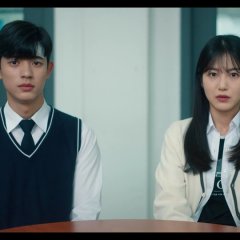
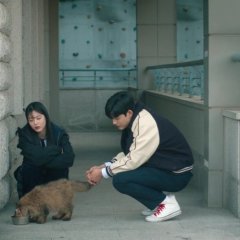

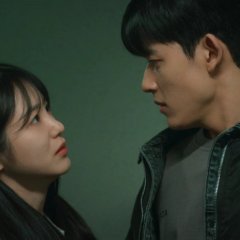
 2
2



